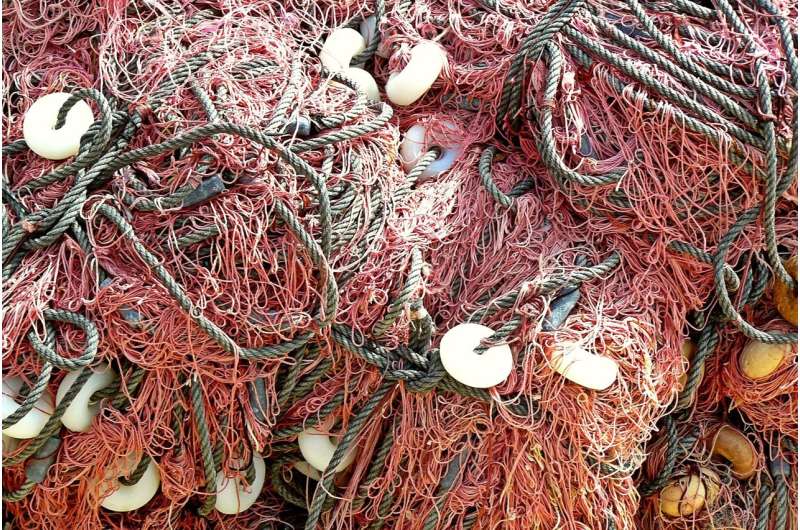Amid the escalating threats of a warming world, and with the latest annual United Nations global climate conference (COP28) behind us, there is one critical message that’s often left out of the climate change discourse. Halting overfishing is itself effective climate action.
This argument is the logical conclusion of a plethora of studies that unequivocally assert that stopping overfishing isn’t just a necessity, it’s a win-win for ocean vitality, climate robustness and the livelihoods reliant on sustainable fisheries.
The intricate relationship between climate change and ocean ecosystems was the subject of recent collaborative research—led by researchers at the University of British Columbia—that highlighted the crucial links between overfishing and climate change.
Finding the connections
Our collaborative team of international researchers applied a host of methodologies ranging from literature reviews to quantitative and quality analysis. The findings of this research illuminate eight key multifaceted impacts.
1. Ending overfishing isn’t merely an ecological imperative but a vital climate action. Doing so would bolster marine life resilience in the face of climate shifts and reduce associate carbon emissions.
2. Large subsidized fishing boat fleets can actually be a burden on small-scale fisheries, leaving them disproportionately vulnerable to shocks. In turn, overfishing not only depletes resources but also escalates carbon emissions, intensifying climate impacts on these fisheries and their communities, particularly women.
Additionally, the vulnerability of shellfish fisheries to climate stressors further underscores the importance of adaptive strategies tailored to local conditions.
3. Success stories, like the recovery of European hake stocks, reveal a direct tie between stock recuperation and reduced emissions intensity from fisheries. We must champion and also learn from these successes.
4. Ecosystem-based fisheries management reverses the « order of priorities so that management starts with ecosystem considerations rather than the maximum exploitation of several target species. »
Ecosystem-based fisheries management has considerable potential to enhance sustainable catches while fostering carbon sequestration. This is perhaps best exemplified by the successful implimentation of ecosystem-based fisheries management in the western Baltic Sea.
5. Heavy metal pollution in the ocean—such as mercury or lead waste—intensifies the negative impacts of warming and overfishing. This pollution reinforces the need for developing multifaceted regulations based around ecosystem and ocean sustainability solutions.
6. Overfishing exacerbates climate and biodiversity threats. Climate change contributes to less defined and predictable seasons and is causing reproductive challenges and the propagation of diseases in fish populations—among other issues.
Adding to these problems, overfishing itself is altering ecological dynamics, modifying habitats and opening new pathways for invasive species. These compounding crises further exacerbate the impacts of overfishing on marine ecosystems while at the same time making fish populations more vulnerable to climate change.
The above factors all combine to reduce the catch potential in any given ecosystem. In turn, fishers are forced to venture farther and deeper in the ocean to fish—increasing carbon emissions, personal risk factors to fishers and bycatch concerns.
7. International fisheries management must play a central role in promoting biodiversity and retaining the ocean’s carbon sequestration potential. While 87 nations have signed the UN’s Biodiversity of Areas Beyond National Jurisdiction Treaty (also known as the High Seas Treaty), only one has ratified it. This treaty must be fully ratified and its effective implementation should be contingent upon the creation of marine protected areas that cover at least 30 percent of the high seas.
8. The ocean has huge carbon sequestration potential. Shifting from the generally accepted maximum of sustainable yield management to maximizing carbon sequestration in fisheries management could further advance climate goals.
Future regulations should allocate a percentage of the annual fish quota to maintain the carbon sequestration function of marine animals. Simply put, beyond just being food, fish stocks serve vital carbon sequestration and biodiversity services that directly benefit humanity. Future regulations should reflect this reality.
A simple goal
This joint collaborative research underscores the urgency of this issue. Ending overfishing isn’t just an ecological imperative but a linchpin for climate action. Furthermore, fisheries aren’t mere victims in these dynamics, but have real agency to play a pivotal role in either exacerbating or mitigating climate change.
An ideal governance framework would focus on managing ecosystems with considerations for their diverse benefits, based on the best evidence available. Regulation of fisheries, while controversial, is essential to not overly exploit such a valuable public resource.
As we gear up to the next COP, we would do well to remember these conclusions. Without nurturing ocean life, addressing climate change becomes an uphill battle. Sustainable fisheries management is not just an ecological necessity. It is also the cornerstone of a resilient, sustainable future.




